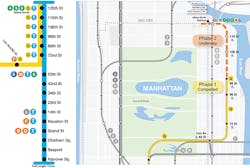OP-ED: Why the NY MTA will have to postpone $6.9-billion Second Avenue Subway Phase 2 to the next five-year capital program
There is little evidence for significant progress in 2020 for the New York Metropolitan Transportation Authority's (MTA) proposed $6.9-billion Second Avenue Subway Phase 2.
According to the Federal Transit Administration (FTA) February 2020 New Starts report for federal fiscal year 2021, the MTA anticipates approval to enter final design and engineering this year. This would be followed with receipt of a Full Funding Grant Agreement (FFGA) from the FTA before the end of 2020. This might provide up to $3.5 billion in federal dollars toward the $6.9 billion total cost. It is unrealistic to assume entering final design and engineering, followed by obtaining approval of an Full Funding Grant Agreement from FTA within the same year with less than five months remaining.
The project still needs one to two more years for completion of design, engineering, business relocation, real estate acquisition and private property easement rights. Agreements with New York City and various owners of underground utilities including water, sewer, gas, electric, steam and cable before being ready to commence construction in 2022 are needed. Successful completion of these agreements can take months to years.
MTA budgeted $4 billion of local funding within the $32-billion 2015 - 2019 Five Year Capital Plan and $51-billion 2020 - 2024 Five Year Capital Plan to be used toward Second Avenue Subway Phase 2. The MTA assumed approval of $500 million in FTA funding as part of the previous $32-billion 2015-2019 Five Year Capital Plan which has come and gone. This proved to be wishful thinking on the part of MTA, as these funds were never approved by FTA during that time period. They may have the same naive assumption concerning winning a $3.5 billion FTA FFGA. These funds would help pay toward the $51-billion 2020 - 2024 Five Year Capital Plan. The MTA's $4 billion in local funds would be better spent dealing with COVID-19 or other far more critical safety and state of good repair capital projects that are needed today. They equal the second request for $3.9 billion in federal CARE COVID-19 funding which appears to be going nowhere fast.
The Independent NYC Budget Commission recently released a report on the MTA, which pronounced the proposed MTA $51-billion 2020 - 2024 Five Year Capital Plan as unrealistic. This is based upon the undeniable facts that the current status for funding sources necessary to support the MTA $51-billion 2020 - 2024 Five Year Capital Plan have always been fragile at best. The MTA continues to place this program on hold due to the unresolved coronavirus financial impacts. This unanticipated crisis has impacted funding sources. Due to the economic recession as a result of COVID-19, billions anticipated from congestion pricing, real estate transfer, internet sales, along with other city and state taxes will not appear.
Both New York state and New York City face their own respective multi-billion dollar budget shortfalls. Who knows when they will each come up with the $3 billion pledged to help fund the MTA $51-billion 2020 - 2024 Five Year Capital Plan. MTA Chairman Pat Foye finally admitted that the anticipated start for Congestion Pricing of January 1, 2021, may be delayed up to one more year. This means that Congestion Pricing will not begin until the start of the third year of a five year Capital Program. Clearly revenues, even in the best of circumstances, will be billions less.
The Independent NYC Budget Commission also questioned the MTA's technical capacity to successfully manage $8.8 billion in carryover plus $51 billion in new capital projects and programs for a record total of $59.8 billion over the next five years.
Several months ago, the NY MTA released a schedule of carryover construction projects from the $29-billion 2010-2014 and $32-billion 2015-19 capital plans. It is slated to begin in 2020 and 2021. MTA has promised to commit $6.5 billion worth of prior planned capital program work in 2020 and $2.3 billion in 2021. This is supposed to complete the initiation of all capital projects and programs from the $29-billion 2010-2014 and $32-billion 2015-2019 capital plans. How will they coordinate management for this $8.8 billion worth of old capital projects with those from the new $51-billion 2020 - 2024 Capital Plan?
All of the previously funded work (that is not under way) will have to be integrated with the current 2020 and future Annual Track Outage, Force Account (in-house employees), Routine Maintenance and Procurement Strategy plans for each MTA agency. This includes NYC Transit bus, subway and Staten Island Rail, Long Island and Metro North Railroads, MTA Capital Construction and MTA Bus. It is necessary in order to support each agencies respective capital programs. The plans provide a foundation to insure projects will be initiated and completed on time.
All of this is taking place while the MTA is undergoing a significant internal reorganization and laying off potentially up to 2,700 employees agency wide. This is suppose to save the MTA $1 billion. These concerns and questions have never been answered in detail. Without reading the fine print, it is difficult to believe that the MTA can successfully manage investing $8.8 billion in old and $51 billion in new funding for a total of $59.8 billion between 2020 and 2024. Results from all the previous five-year capital plans going back to the early 1980s cast serious doubt on this promise.
Without Congestion Pricing and other anticipated revenue streams. the $51-billion 2020 - 2024 Five Year Capital Plan will have to be cut by $10-$20 billion. This will result in a plan similar to the previous $32 billion 2015 - 2019 Five Year Capital Plan.
Safety and the backlog for state of good repair projects and programs along with bringing more stations into compliance with ADA should take priority over any system expansion projects, such as the $6.9 billion Second Avenue Subway Phase 2 or $1.5 billion Metro North Bronx East Penn Station Access projects. These are the first two projects which will have to be postponed until the next MTA 2025 - 2029 Five Year Capital Plan. Sooner or later, MTA Chairman Pat Foye, the MTA Board, NY Governor Andrew Cuomo, NYC Mayor Bill de Blasio are going to have to face the music. It is time they come clean with commuters, taxpayers, transit advocates, funding agencies such as the Federal Transit Administration and other local elected officials with a new game plan today, not months from now.
----------------------------------------------------------
Larry Penner is a transportation historian and advocate who previously worked 31 years for the Federal Transit Administration Region 2 NY Office. This included the development, review, approval and oversight for grants supporting billions in capital projects and programs on behalf of the Metropolitan Transportation Authority, New York City Transit bus and subway, Long Island Rail Road and Metro-North Railroad, MTA Bus and NYC Department of Transportation.

Larry Penner
Larry Penner is a transportation advocate, historian and writer who previously served as a former director for the Federal Transit Administration Region 2 New York Office of Operations and Program Management. This included the development, review, approval and oversight for billions in capital projects and programs for New Jersey Transit, New York Metropolitan Transportation Authority, NYC Transit bus, subway and Staten Island Railway, Long Island and Metro North railroads, MTA Bus, NYCDOT Staten Island Ferry along with 30 other transit agencies in New York and New Jersey.


